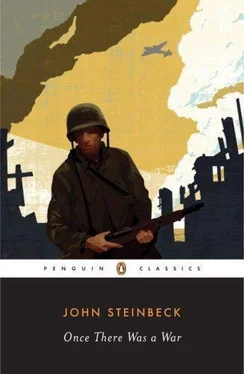John Steinbeck - Once there was a war
Здесь есть возможность читать онлайн «John Steinbeck - Once there was a war» весь текст электронной книги совершенно бесплатно (целиком полную версию без сокращений). В некоторых случаях можно слушать аудио, скачать через торрент в формате fb2 и присутствует краткое содержание. Город: New York, Год выпуска: 1960, Издательство: Bantam Books, Жанр: Классическая проза, на английском языке. Описание произведения, (предисловие) а так же отзывы посетителей доступны на портале библиотеки ЛибКат.
- Название:Once there was a war
- Автор:
- Издательство:Bantam Books
- Жанр:
- Год:1960
- Город:New York
- ISBN:нет данных
- Рейтинг книги:3 / 5. Голосов: 1
-
Избранное:Добавить в избранное
- Отзывы:
-
Ваша оценка:
- 60
- 1
- 2
- 3
- 4
- 5
Once there was a war: краткое содержание, описание и аннотация
Предлагаем к чтению аннотацию, описание, краткое содержание или предисловие (зависит от того, что написал сам автор книги «Once there was a war»). Если вы не нашли необходимую информацию о книге — напишите в комментариях, мы постараемся отыскать её.
Once there was a war — читать онлайн бесплатно полную книгу (весь текст) целиком
Ниже представлен текст книги, разбитый по страницам. Система сохранения места последней прочитанной страницы, позволяет с удобством читать онлайн бесплатно книгу «Once there was a war», без необходимости каждый раз заново искать на чём Вы остановились. Поставьте закладку, и сможете в любой момент перейти на страницу, на которой закончили чтение.
Интервал:
Закладка:
There is a quality in the people of Dover that may well be the key to the coming German disaster. They are incorrigibly, incorruptibly unimpressed. The German, with his uniform and his pageantry and his threats and plans, does not impress these people at all. The Dover man has taken perhaps a little more pounding than most, not in great blitzes, but in every-day bombing and shelling, and still he is not impressed.
Jerry is like the weather to him. He complains about it and then promptly goes about what he was doing. Nothing in the world is as important as his garden and, in other days, his lobster pots. Weather and Jerry are alike in that they are inconvenient and sometimes make messes. Surveying a building wrecked by a big shell, he says, “Jerry was bad last night,” as he would discuss a windstorm.
It goes like this — on the Calais hill there is a flash in the night. Immediately from Dover the sirens give the shelling warning. From the flash you must count approximately fifty-nine seconds before the explosion. The shell may land almost anywhere. There is a flat blast that rockets back from the cliffs, a cloud of debris rising into the air. People look at their watches. The next one will be in twenty minutes. And at exactly that time there is another flash from the French coast, and you count seconds again. This goes on sometimes all night. One hour after the last shell the all-clear sounds. This does not mean that it is over. Jerry sometimes lobs another one in, hoping to kill a few more people.
In the morning there are wrecked houses; the dead have been dug out. A little band of men are cleaning the debris out of the street so that traffic may go by. A policeman keeps the people from coming too close for fear a brick may fall. That house is probably wrecked and will be unlivable until the war is over, but the houses all about are hurt. The windows are all blown out, and there will be no glass until after the war, either. The people are already sticking paper over the broken windows. Plaster has fallen in the houses all about. A general house cleaning is in progress. Puffs of swept plaster come out the doors. Women are on their knees, with pails of water, washing the floors. The blast of a near shell cleans the chimneys, they say. The puff of the explosion blows the soot out of the chimney and into the rooms.
There is that to clean up, too. In a front yard a man is standing in his garden. A flying piece of scantling has broken off a rose bush. The bud, which was about to open, is wilting on the ground. The man leans down and picks up the bud. He feels it with his fingers and carries it to his nose and smells it. He lifts the scantling from the trunk and looks at it to see whether it may not send out new shoots, and then, standing up, he turns and looks at the French coast, where five hundred men and a great tube of steel and high explosive and charts and plans, mathematical formulae, uniforms, telephones, shouted orders, are out to break a man’s rose bush. A neighbor passes in the street.
“The Boche was bloody bad last night,” he says. “Broke the yellow one proper,” he says. “And it was just coming on to bloom.”
“Ah, well,” the neighbor says, “let’s have a look at it.” The two kneel down beside the bush. “She’s broke above the graft,” the neighbor says, “she’s not split. Probably shoot out here.” He points with a thick finger to a lump on the side of the bush. “Sometimes,” he says, “sometimes, when they’ve had a shock, they come out prettier than ever.”
Across the Channel, in back of the hill that you can see, they are cleaning the great barrel, studying charts, making reports, churning with Geopolitik.
MINESWEEPER
LONDON, July 7, 1943 —
Day after day the minesweepers go out. Small boats that in peacetime fished for herring and cod. Now they fish for bigger game. They are equipped with strange, new fish lines. The crews are nearly all ex-fishermen and whalers and the officers are from the same tough breed. Theirs is an unromantic and unpublicized job that must be done and done very thoroughly. The danger lurks without flags and firing. Very few decorations are awarded to the minesweeping men.
They usually sail out of the harbor in a line, three boats to sweep and two to drop the buoyed flags, called dans, which mark the swept channel. Once on the ground to be swept, three of the boats deploy and travel abreast at exact and set distances from one another. The space between them is the area that can be reached by their instruments. The little boats are searching for the two kinds of mines which are usually planted — the magnetic mines which explode when a ship with its self-created magnetic field sails over, and the other kind which is exploded by the vibration of a ship’s engines. The sweepers are equipped with instruments to explode either kind and to do it at a safe distance from themselves.
The three abreast move slowly over the area to be cleared of mines and behind them the dan ships follow at intervals, putting out the flags. At the end of their run they turn and come back, overlapping a little on the old course and the dan ships pick up the flags and set them on the outer course again.
All the boats are armed against airplanes. The gunners stand at their posts and search the sky constantly, while the radio operator listens to the spotting instruments on the shore. They take no chances with the planes. When one comes near them they train their guns in that direction until they recognize her. And even the friendly planes do not fly too close. For these men have been bombed and fired on from the air so often that they will fire if there is any doubt at all. Sticking up out of the water are the masts of many ships sunk early in the war when the German planes ranged over the Channel almost with impunity. They do not do it any more.
The voice of the radio man comes up through the speaking tube to the little bridge. “Enemy aircraft in the vicinity,” he says, and then a moment later, “Red alert.” The gunners swing their guns and the crew stands by, all eyes on the sky. From the English coast the Typhoons boil out angrily, fast and deadly ships that fly close to the water. In the distance the enemy plane is a spot. It turns tail and runs for the French coast. The radio man calls, “All clear,” and the crew relaxes.
On the little bridge the captain directs the laying down of the colored flags, while his second checks the distance between the boats. If the dan ship gets too close, a mine may explode under her. With instruments the distance is checked every few seconds. The little flotilla moves very slowly, for when it has passed and marked the free channel the ships with supplies must be able to come through in safety.
Suddenly the dan ship is struck by a heavy blow, the sea about flattens out and shivers, and then a hundred yards ahead a tower of water and mud bursts into the air with a roar. It seems to hang in the air for a long time and when it falls back the dan ship is nearly over it.
There is a large, dirty place on the ocean, bottom mud and a black gluey substance, which comes from the explosive. The crew rush to the side of the ship and search the water anxiously. “No fish,” they say. “What has happened to the fish? You’d think there would be one or two killed by the blast.” They have set off one of the most terrible weapons in the world and they are worried about the fish.
The captain marks with great care on his chart the exact place where the mine was exploded. He takes several sights on the coast to get the position. Another mine roars up on the other side of the lane. The second in command takes up the blinker and signals, “Any fish?” and the answer comes back, “No fish.”
The day is long and tedious, sweeping and turning and sweeping, and when the job is done it is only done until the night, for on this night the mine layers may creep over from the French coast and sow the field again with the nasty things, or a plane may fly low in the darkness and drop the mines on parachutes. The work of the sweepers is never finished.
Читать дальшеИнтервал:
Закладка:
Похожие книги на «Once there was a war»
Представляем Вашему вниманию похожие книги на «Once there was a war» списком для выбора. Мы отобрали схожую по названию и смыслу литературу в надежде предоставить читателям больше вариантов отыскать новые, интересные, ещё непрочитанные произведения.
Обсуждение, отзывы о книге «Once there was a war» и просто собственные мнения читателей. Оставьте ваши комментарии, напишите, что Вы думаете о произведении, его смысле или главных героях. Укажите что конкретно понравилось, а что нет, и почему Вы так считаете.









